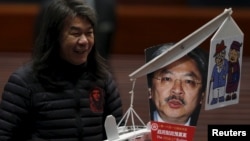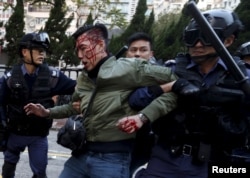Two weeks after the worst riot in years, Hong Kong is still feeling the shock waves.
During his annual budget address Wednesday, Hong Kong Financial Secretary John Tsang warned that the territory's economy will suffer without political stability.
"We anticipate that political disputes will only intensify over the coming months," Tsang said. "Politics and economics are closely intertwined. Political volatility will unavoidably impact our economy. It is the duty of the government to take on challenges in our society."
But Tsang’s statement, some protesters say, did little to help alleviate their anger over the city government’s failure to address structural reforms.
"Unless we have true universal suffrage and also we can use our surpluses to have to genuine reform in terms of the social welfare system, as well as the education system, … a one-time sweetener wouldn’t help alleviate the anger of Hong Kong people," said Avery Ng, chairman of the League of Social Democrats.
Worst riot in years
On February 8, protests against police clearing illegal food venders in the bustling district of Mong Kok turned violent after masked demonstrators hurled bricks and bottles at the officers, who responded with batons and pepper spray. The tension peaked after a police officer fired two warning shots in the air.
The overnight violence left more than 130 people, including 80 police officers, injured while 74 were arrested, according to local media reports.
One leader of a radical local group accused of instigating the riot, 22-year-old Ray Wong, was released on bail late Tuesday on a charge of rioting. If found guilty, he faces up to 10 years in jail.
A rise in localism
The riot signals rising anti-China sentiments among a younger generation frustrated by the lack of democracy and widening economic disparity following closer ties with Beijing, analysts say.
"This [is] rooted in the fact that the wealth gap – the disparity between the very rich and the very poor in Hong Kong – is widening. A lot of people do not see hope in terms of what their future is going to be like," says Oh Ei Sun, senior fellow with Nanyang Technological University's Malaysia Program at the S. Rajaratnam School of International Studies.
The younger generation's frustration has fueled the rise of localism and calls for political independence from Beijing, said Dixon Sing, associate professor of social science at the Hong Kong University of Science and Technology.
Harm to pro-democracy movement?
The February 8 violence has alienated youth further from the pro-Beijing government in Hong Kong, but it also has hurt the reputation of pro-democracy activists, who have insisted on peaceful protests the past two years, the professor added.
"The whole saga has multiple consequences," Sing said. "For the general public, it could be more to the downside in terms of diminishing the support for the pan-democrats."
But, he added, "I think it has angered further, alienated further, the younger generation from the government, and has radicalized further some of them."
Because Hong Kong doesn’t have a tradition of supporting violent movement and revolution, such violent action may fail to garner strong support from the majority of people. That will end up lending ammunition to the city’s pro-Beijing forces, Sing added.
To ease social unrest, authorities in Hong Kong should take the protesters seriously, Nanyang University’s Oh urged, saying that "Hong Kong authorities should really, proactively, take the first step in terms of reaching out to this dissatisfied segment of the society."













